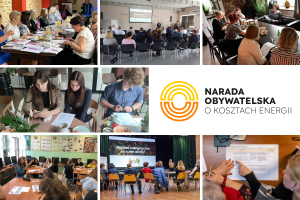In October 2022, the first national-level citizens' assembly in Poland began, organized by the Stocznia Foundation. This assembly had a grassroots nature and was non-binding, unlike other assemblies in Poland organized by local authorities, which commit to implementing recommendations receiving 80% support. The theme of the citizens' assembly was the issue of energy poverty. The assembly lasted for five days, divided into three meetings. During these meetings, experts presented the issue of energy poverty, encompassing aspects of low incomes, high energy costs, and the energy efficiency of buildings. The official inauguration and educational part took place on October 22-23 in Warsaw, while the deliberative part occurred on November 5-6, also in Warsaw, concluding with voting on November 16, 2022.
Our research team participated as Observers, supporting the Organizer in ensuring compliance with adopted standards and the methodology of the citizens' assembly, while simultaneously studying it for scientific purposes. Prof. Pospieszna and Magni Szymaniak-Arnesen had the opportunity to be among other individuals with scientific and/or practical experience in the methodology of citizens' assemblies.
In addition to observing the assembly, our team, in collaboration with the Organizer, Stocznia Foundation, developed a survey as a research and evaluation tool. This survey was conducted before and after the assembly, with questions inspired by research conducted by scientists from the University of Luxembourg and ULB in Brussels (thanks to cooperation with Dr. Emilien Paulis). The main goal of our research was to examine whether assembly participants perceive this process as effective in making decisions on various policies. We were also interested in whether the assembly influences the perception of agency and the role of the individual in society, as well as trust in institutions and the perception of democracy. We were curious about the motivation of panelists, their information-seeking behavior, and their knowledge of the problem addressed by the assembly. All these aspects were considered in both surveys, with some questions repeated to observe any changes. Additionally, the post-assembly survey included evaluative questions, divided into thematic blocks covering the relevance of the issue, recruitment and participation, the evaluation process, deliberation process, assembly organization, experts, outcomes and recommendations, as well as attitudes towards citizens' assemblies.
The survey results made a significant contribution to the preparation of the citizens' assembly summary report. Additionally, we provided comments on the assembly that was published in the final report.
